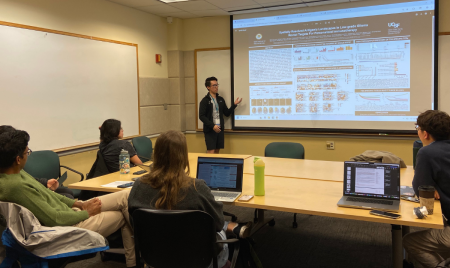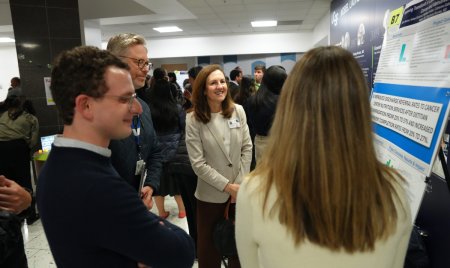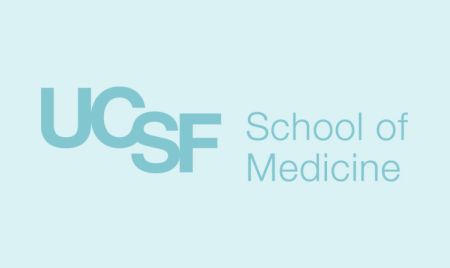Spring Inquiry Symposium: Class of 2024 Advances Knowledge Through Scientific Scholarship
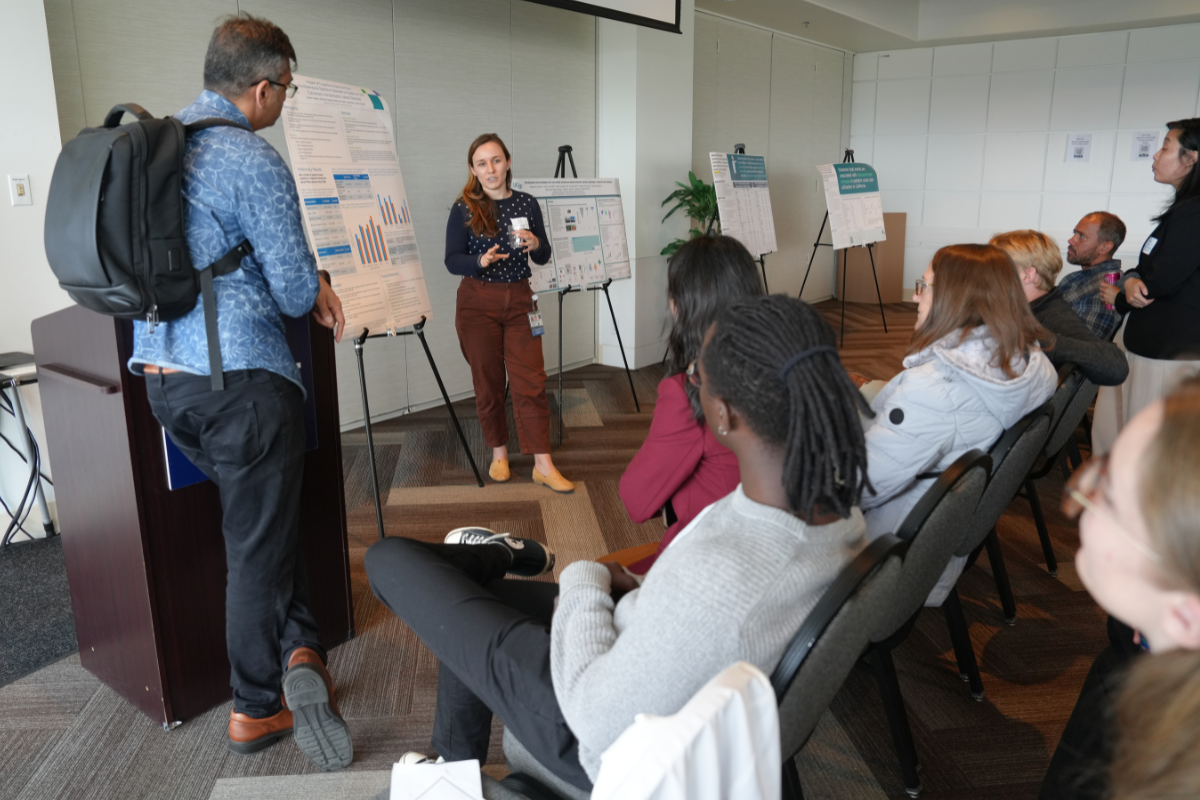
On May 16, 2024, 127 fourth-year UCSF medical students showcased their Deep Explore and year-long research projects through oral and poster presentations during the spring Inquiry Symposium at Millberry Union on the UCSF Parnassus Heights campus. An array of student research topics were on display, ranging from clinical to basic science and medical education.
The UCSF School of Medicine’s Bridges Curriculum provides students with various opportunities for scientific exploration throughout all four years. From day one to the culmination of the Inquiry Symposium, the Inquiry Curriculum teaches students a “habit of mind.” Each step of the four-year curriculum advances the learner, first to a sophisticated consumer of biomedical science, and then to a producer of new knowledge.
As part of the pursuit of new knowledge, fourth-year UCSF medical students participate in a “Deep Explore,” project, where they are provided 12-20 weeks of protected time to develop and execute an independent project with the guidance of a faculty mentor.
23 of the 127 students dedicated 12 months to research as part of the School of Medicine Inquiry Funding Office’s Yearlong Research program. These students received stipend funding and a range of specialized training programs, expert mentorship, and global health experiences. The Inquiry Funding Office also provides students with travel funding to present their research at conferences.
Mallar Bhattacharya, MD, Inquiry Funding Office Director, said, “The spring Inquiry Symposium is the culmination of four years of scholarship, partly funded by the Inquiry Funding Office. We’ve repeatedly seen that research opportunities and the relationships formed with faculty mentors during research inspire students’ career goals, instill confidence, and form the professional connections that are building blocks to success in both residency and their long-term career paths.”
Rita Redberg, MD, MS, Inquiry Curriculum Director, began the symposium by describing the event as “a celebration of the students and their remarkable achievements.” She reflected on the “challenging events within the past few years…and how they only underscore the critical role of scholarship in all parts of life, advancing health and health science worldwide.” Dr. Redberg shared her hope that “this inquiry serves as the beginning for the Class of 2024,” and encouraged attendees to “help the world do better.” She ended by sharing a quote by author Maya Angelou, “Do the best you can until you know better. Then when you know better, do better.”
Michael Lipnick, MD, Associate Professor of Anesthesia, delivered the event’s keynote address, which focused on the lessons learned on his academic journey. He shared how his global work experience in Uganda gave him purpose, how he saw people’s limited access to surgery and anesthesia, and the disparities in access to care. He emphasized to the class “the importance of having a purpose in career and life... to work on things that are important to you and to work with communities that are important to you.” He challenged the class to “do things that others can’t or won’t.”
Each year, ten students who demonstrate outstanding scholarship are awarded the Dean’s Prize Award. Five students were selected for the Dean’s Prize in Deep Explore and five were awarded the Dean’s Prize in Yearlong Research. The Dean’s Prize winners are selected based on the strength of their abstract, their mentor’s nomination, and a successful presentation to the faculty review committee. Two Student Choice Awards (one from the Deep Explore category and one from the Yearlong Inquiry category), were selected by the Class of 2024 to give an oral research presentation during the symposium.
Nora Rudd, Class of 2024, was selected by the class among the Deep Explore Dean’s Prize awardees to orally present her research on the association between psoriasis and cardiometabolic comorbidities in a racially and ethnically diverse low-income primary care population. Allan Ndovu, Class of 2024, was selected among the Yearlong Dean’s Prize awardees to present his research on the spatial variation in the effect of extreme heat events on pediatric acute care utilization from 2005 to 2019 in California.
In an interview with Dean's Prize awardees, Rachel Warren, Class of 2024, reflected on her Deep Explore experience, saying, "Deep Explore is a great experience that gives students the flexibility and autonomy to drive their project and build their skills." Nora Rudd added, "I like the program's structure and how it drives students to write a proposal that eventually makes things easier in the manuscript stage." Edwina Tran, Class of 2024, shared that she appreciated "the creative space to build one's scientific question, design experiments, and test our your ideas and whether they will hold up."
Mentors’ dedication and guidance are integral to the student’s success in their research projects. Therefore, in addition to the yearly student awards, the Inquiry Curriculum also gives Mentor Awards to recognize mentors who went above and beyond in demonstrating their dedication to education and creating an encouraging and intellectually stimulating environment that promotes critical thinking and learning.
Dr. Brian Feeley, MD, Professor of Orthopedic Surgery, one of this year’s five mentor awardees, and project mentor of Aboubacar Wague, said, “Student-led research gives people with a lot of talent the ability to be creative and innovative with research.” Dr. Feeley reflected on his mentor role, saying, “Our job as mentors is to create an avenue in research for students to express themselves and be creative.”
The Class of 2024 is taking the next steps in their careers, and each learner will take with them the habits of mind learned through the Inquiry Curriculum’s four years of scientific exploration. Many of these learners will continue to pursue creative and insightful research and will make significant contributions to medical inquiry.
Learn more about the various funding opportunities available to UCSF medical students on the Inquiry Funding Office webpage.
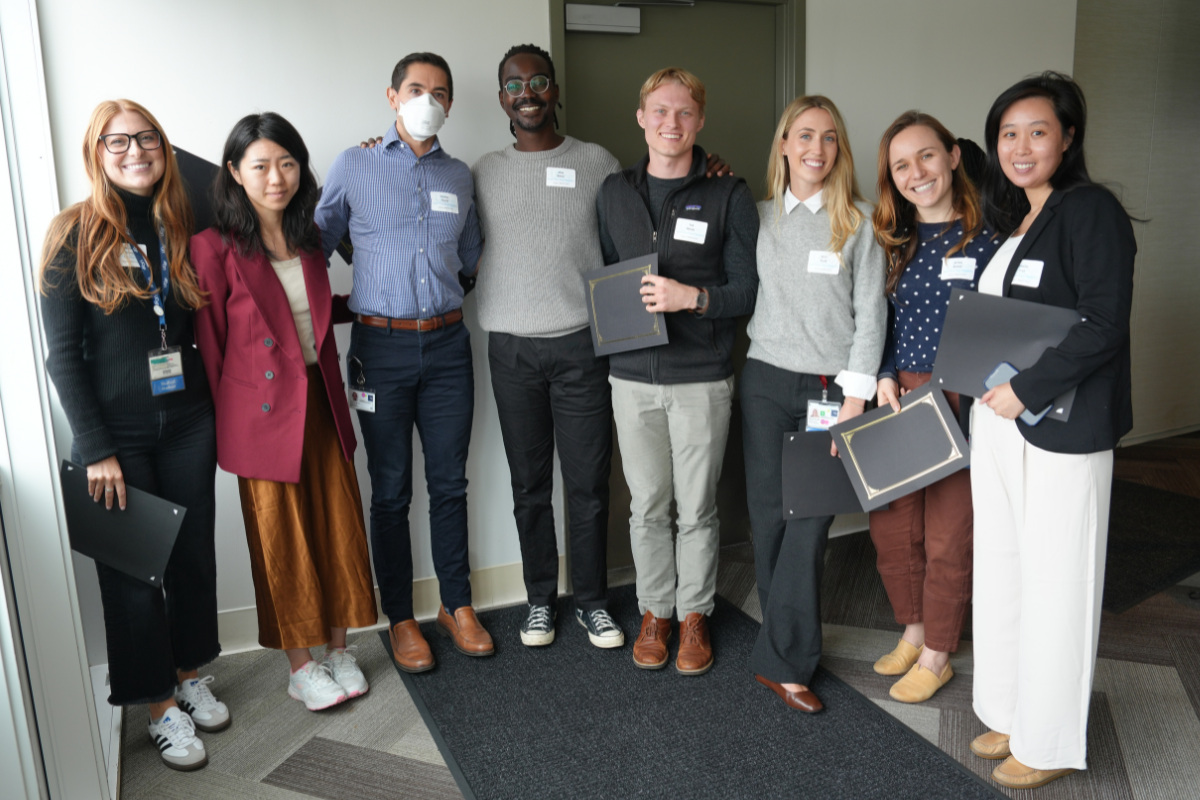
Dean’s Prize in Yearlong Research Awardees:
Israel Falade
Oncologic Safety of Immediate Oncoplastic Surgery Compared to Standard Breast-Conserving Surgery for Patients with Invasive Lobular Carcinoma
Mentor: Rita Mukhtar, MD, Associate Professor of Surgery
Allan Ndovu
Spatial Variation in the Effect of Extreme Heat Events on Pediatric Acute Care Utilization: A Small-Area Assessment of Multiple Health Conditions and Environmental Justice Implications in California (2005-2019)
Mentor: Tarik Benmarhnia, PhD, Associate Professor, Epidemiology, University of California, San Diego
Shirley Shao
Maternal and Neonatal Outcomes with Different Screening Strategies for Gestational Diabetes Mellitus
Mentor: Nasim Sobhani, MD, MAS, Assistant Professor of Obstetrics, Gynecology and Reproductive Sciences
Edwina Tran
Development and Validation of a Non-Verbal Consensus-Based Semantic Memory Paradigm in Patients with Epilepsy
Mentor: Jon Kleen, MD, PhD, Assistant Professor of Neurology
Aboubacar Wague
Novel Machine Learning Approach to Assess Function in Musculoskeletal Mice Models
Mentor: Brian Feeley, MD, Professor of Orthopedic Surgery
Dean’s Prize in Deep Explore Awardees:
Ariana Andere
Impact of Cognitive Impairment from Frontotemporal Spectrum Disorder on Quality-of-Life Outcomes in Amyotrophic Lateral Sclerosis
Mentor: Catherine Lomen-Hoerth, MD, PhD, Professor of Neurology
Thomas Ituarte
Peptide and Amino-Acid Motif Signatures of HLA Haplotypes in Human Health
Mentor: Michael Wilson, MD, Professor of Neurology
Ted Miclau
Feasibility of a Mobile Application to Track Longitudinal Pain Outcomes after Spinal Joint Injections
Mentor: Patricia Zheng, MD, Associate Professor of Orthopedic Surgery
Nora Rudd
Association between Psoriasis and Cardiometabolic Comorbidities in a Racially and Ethnically Diverse Low-Income Primary Care Population
Mentor: Erin Amerson, MD, Professor of Dermatology
Rachel Warren
Characterizing Safety Triggers for High-Risk Medical Device Recalls, 2022
Mentor: Rita Redberg, MD, MS, Professor of Medicine
Mentor Award Recipients:
Nisha Acharya, MD, Professor, Proctor Foundation
Mentee: Samantha Sechrist
Odmara Barreto Chang, MD, PhD, Assistant Professor of Anesthesia
Mentee: Niti Pawar
Brian Feeley, MD, Professor of Orthopedic Surgery
Mentee: Aboubacar Wague
Jeremy Keenan, MD, MPH, Professor, Proctor Foundation
Mentee: Binh Cao
Patricia Zheng, MD, Associate Professor of Orthopedic Surgery
Mentee: Ted Miclau
